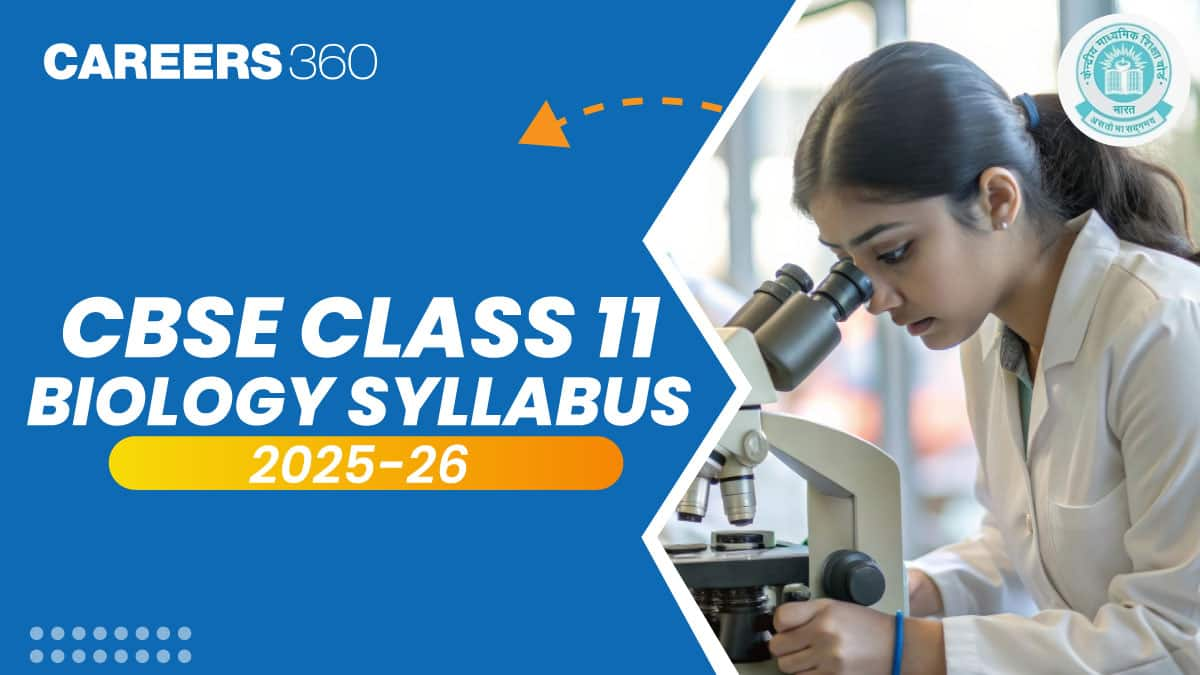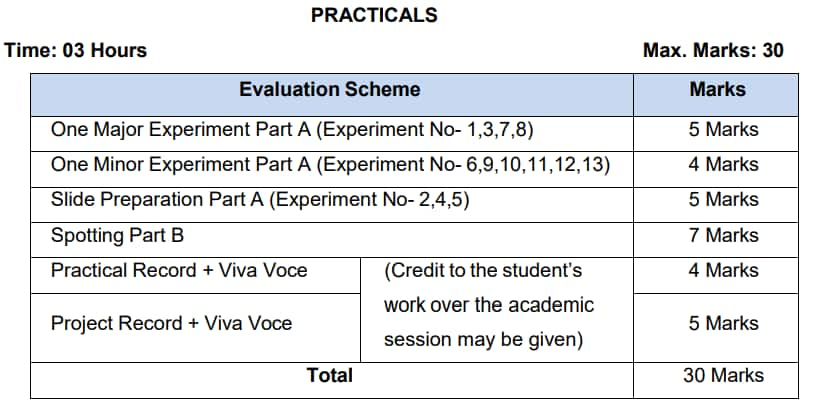CBSE Class 11 Biology Syllabus 2025-26: Download PDF, Topics & Practical Details
The latest CBSE Class 11 Biology syllabus for 2025-26 is now available at cbseacademic.nic.in. Students can visit the website and easily download the CBSE 11th Bio syllabus PDF 2025-26. The theory paper consists of 70 marks total, and 30 marks are reserved for practicals/internal assessment.

The CBSE Class 11 Biology syllabus 2025-26 is divided into five units. The main topics include Diversity of Living Organisms, Cell Structure, and Physiology in both plants and humans. Human Physiology has the highest weightage with 18 marks, followed by Diversity of Living Organisms and Cell Structure and Function, which carry 15 marks each. Students can find the direct download link below to the latest CBSE Class 11 Biology 2025-26 syllabus PDF:
Download CBSE 11th Biology 2025-26 PDF
Subject Name | PDF Download Link |
CBSE Class 11 Biology Syllabus 2025-26 |
Topics Incorporated in CBSE 11th Biology Syllabus 2025-26
The topics covered in the CBSE 11th Bio syllabus for 2025-26 are mentioned below. Students can also have a look at the marks allocation for each unit.
Unit | Title | Marks |
I | Diversity of Living Organisms | 15 |
II | Structural Organisation in Plants and Animals | 10 |
III | Cell: Structure and Function | 15 |
IV | Plant Physiology | 12 |
V | Human Physiology | 18 |
Total | 70 | |
Unit-Wise CBSE 11th Biology Syllabus 2025-26
The unit-wise topics incorporated in the CBSE 11th Bio syllabus are mentioned in the table below. There are a total of 5 units and 19 chapters in the official syllabus. Students can have a look at it and prepare the topics from the NCERT 11th Biology book.
Unit No. & Name | Chapter Name | Topics Covered |
Unit I: Diversity of Living Organisms | The Living World | Biodiversity, Need for classification, Three domains of life, Taxonomy and systematics, Species concept, Taxonomical hierarchy, Binomial nomenclature |
Biological Classification | Five Kingdom classification, Features and classification of Monera, Protista, Fungi, Lichens, Viruses, Viroids | |
Plant Kingdom | Classification and features of Algae, Bryophyta, Pteridophyta, Gymnospermae, Angiosperms | |
Animal Kingdom | Features and classification of non-chordates (up to phylum) and chordates (up to class level) | |
Unit II: Structural Organisation in Animals and Plants | Morphology of Flowering Plants | Morphology of root, stem, leaf, inflorescence, flower, fruit, seed; Family Solanaceae description |
Anatomy of Flowering Plants | Anatomy and functions of tissue systems in dicots and monocots | |
Structural Organisation in Animals | Frog morphology, anatomy and function of digestive, circulatory, respiratory, nervous, and reproductive systems | |
Unit III: Cell - Structure and Function | Cell - The Unit of Life | Cell theory, Prokaryotic and eukaryotic cells, Structure and function of cell organelles, Cell membrane, Cell wall, Nucleus |
Biomolecules | Biomolecules: proteins, carbs, lipids, nucleic acids; Enzyme types, properties, and action | |
Cell Cycle and Cell Division | Cell cycle phases, Mitosis, Meiosis and their significance | |
Unit IV: Plant Physiology | Photosynthesis in Higher Plants | Site and phases of photosynthesis, Photophosphorylation, C3 & C4 pathways, Factors affecting photosynthesis |
Respiration in Plants | Glycolysis, Fermentation, TCA cycle, Electron transport system, ATP production, RQ | |
Plant - Growth and Development | Seed germination, Phases and rate of growth, PGRs (auxin, gibberellin, cytokinin, ethylene, ABA) | |
Unit V: Human Physiology | Breathing and Exchange of Gases | Human respiratory system, Breathing mechanism, Gas exchange, Transport, Respiratory disorders |
Body Fluids and Circulation | Blood composition, Blood groups, Coagulation, Heart structure, ECG, Cardiac output, Disorders | |
Excretory Products and Their Elimination | Human excretory system, Urine formation, Osmoregulation, Kidney regulation, Disorders, Dialysis | |
Locomotion and Movement | Types of movement, Skeletal muscle, Muscle contraction, Skeletal system, Joint and muscle disorders | |
Neural Control and Coordination | Neuron, Human nervous system, Nerve impulse generation and conduction | |
Chemical Coordination and Integration | Human endocrine glands, Hormones, Mechanism of action, Related disorders |
CBSE Class 11 Biology Practical Syllabus 2025-26
In the following table, students can go through the CBSE Class 11 Biology subject syllabus for the practicals.
Section | Details |
A. List of Experiments | 1. Study of common flowering plants from Solanaceae (or region-specific family), dissection of floral parts, study of root, stem, and leaf types. 2. Preparation and study of transverse sections (T.S.) of dicot and monocot roots and stems. 3. Demonstration of osmosis using a potato osmometer. 4. Study of plasmolysis in Rhoeo/lily/onion epidermal peels. 5. Distribution of stomata on upper and lower leaf surfaces. 6. Comparative transpiration rate in upper vs lower surfaces of leaves. 7. Biochemical tests for sugar, starch, proteins, and fats in plant/animal materials. 8. Separation of plant pigments using paper chromatography. 9. Study of respiration rate in flower buds, leaves, or germinating seeds. 10. Test for urea in urine. 11. Test for sugar in urine. 12. Test for albumin in urine. 13. Test for bile salts in urine. |
B. Spotting (Study & Observation) | 1. Identification and parts of a compound microscope. 2. Study of specimens/slides/models: Bacteria, Oscillatoria, Spirogyra, Rhizopus, mushroom, yeast, liverwort, moss, fern, pine, monocot plant, dicot plant, lichen. 3. Study of virtual specimens/slides/models: Amoeba, Hydra, liver fluke, Ascaris, leech, earthworm, prawn, silkworm, honey bee, snail, starfish, shark, rohu, frog, lizard, pigeon, rabbit. 4. Study of mitosis in onion root tip and grasshopper cells (permanent slides). 5. Identification of cymose and racemose inflorescences. 6. Study of human skeleton and joints using virtual images/models only. |
Image of CBSE 11th Biology Practical Marks Allocation

Tips to Prepare for CBSE 11th Biology Paper 2025-26
Go through the NCERT 11th Biology book properly. NCERT-based questions form the core of the exam.
Practice drawing flowcharts, labelled diagrams wherever necessary. Adding a reference image to support answers may reward you with extra points.
Prepare short notes after studying each chapter. These are particularly helpful during last-minute revision.
Students can also download CBSE 11th Biology sample papers from the official website and strengthen their preparation for the subject.
Frequently Asked Questions (FAQs)
Yes, well-labelled diagrams are often asked for and can fetch full marks.
There are 5 units, covering 19 chapters in total.
The best textbook is the NCERT Class 11 Biology book. It is highly recommended and sufficient to prepare for final exams.
Questions related to CBSE Class 10th
On Question asked by student community
Class 10 CBSE 2026
Chennai Sahodaya
common examination papers are currently available. Students can directly download theseCBSE 10th Sahodayaquestion papers from the given link below. They can practice these question papers using timmer.
Direct Link: Class 10 CBSE Sahodaya Question Paper
Students can download Banglore Sahodaya Science pre board paper is provided by schools first. After the exam schools upload the paper online. We have provided the Banglore Sahodaya question paper below
Download CBSE Banglore Sahodaya Science Question Paper Here
CBSE Banglore Sahodaya Paper Structure (Class 10 Science)
The Bangalore Sahodaya
Hello,
The link to the question paper is attached here. You can also find the answer key on the website of Careers360. Careers360 also provide student with preparation tips that will help them utilise their time in preparation.
https://school.careers360.com/articles/cbse-sahodaya-class-10-pre-board-question-paper-2025-26
Thank you.
Hello,
The link to the question paper is attached here. You can also find the answer key for the subjects on the careers360 website that will help you analyse in-depth performance.
https://school.careers360.com/articles/chennai-sahodaya-question-paper-2025-26
Thank you
Hello
You will be able to download the CBSE Class 10th Sample Paper 2025-26 from our official website, careers360, by using the link which is given below.
https://school.careers360.com/boards/cbse/cbse-10th-maths-sample-papers-2025-26
Thank you.
Applications for Admissions are open.
As per latest syllabus. Physics formulas, equations, & laws of class 11 & 12th chapters
JEE Main Important Chemistry formulas
Get nowAs per latest syllabus. Chemistry formulas, equations, & laws of class 11 & 12th chapters
JEE Main high scoring chapters and topics
Get nowAs per latest 2024 syllabus. Study 40% syllabus and score upto 100% marks in JEE
JEE Main Important Mathematics Formulas
Get nowAs per latest syllabus. Maths formulas, equations, & theorems of class 11 & 12th chapters
